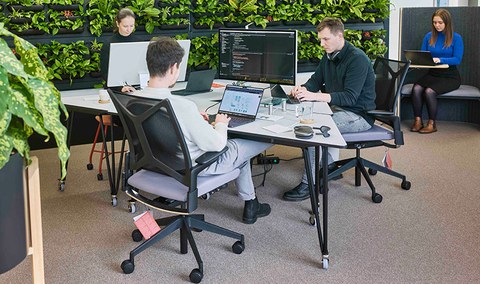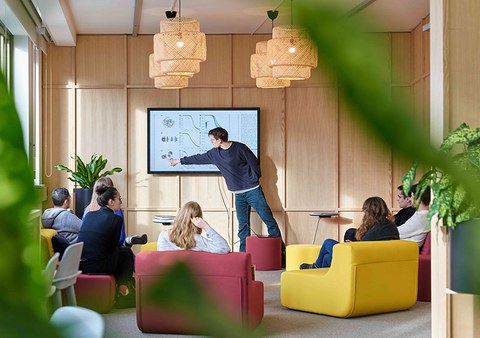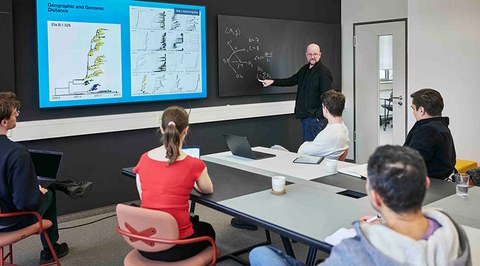11.08.2025
Zentrum für digitale Wissenschaften
Dagmar Möbius
Im Center for Interdisciplinary Digital Sciences (CIDS) sollen perspektivisch mehr als 500 Beschäftigte in acht Departments disziplinübergreifend wissenschaftliche Fragestellungen im Themenspektrum von Digitalisierung, Hochleistungsrechnen, Daten, Modellierung und Simulation, Künstliche Intelligenz, Wissensextraktion und -vermittlung, Einsatz digitaler Medien in der Lehre, soziale Interaktionen und mehr bearbeiten.

Arbeiten im Grünen: In der offenen Bürofläche bei SynoSys entstehen konzentrierte und kollaborative Arbeitsprozesse.
Unter dem Dach des CIDS befinden sich bereits drei Departments, fünf gründen sich noch:
- SCADS.AI Dresden/Leipzig – interdisziplinäre KI- und Big-Data-Forschung in Dresden
- Center for Open Digital Innovation and Participation (CODIP)
- Department Speculative Transformation (DST)
- Informationsdienste und Hochleistungsrechnen (ZIH)
- Computational Modeling and Simulation (CoMoS) - Rechnergestützte Modellierung und Simulation
- Living Labs Computer Science Saxony (LICOSS)
- Synergy of Systems (SynoSys)
Alle Departments eint das Ziel: exzellente Forschung. Und sie arbeiten miteinander. Effizient, schnell und leistungsfähig durch Vernetzung. Zentral genutzt werden das Support Center Digitalisierung, ein Transferzentrum und das Interactive Science Labs. Kontakt-online schaut sich stellvertretend das SynoSys an.

Kollaboration im Fokus: Informelles Meeting bei SynoSys
Grenzen überschreiten für die Wissenschaft
Das „Kaleidoskop der Gefangenen“ ist ein Beispiel für komplexe Phänomene und eins der am meisten gelesenen auf der Webseite von SynoSys. Im Spiel „Gefangenen-Dilemma“ können zwei Spieler wählen, ob sie kooperieren oder sich gegenseitig hintergehen wollen. Vorab festgelegte Auszahlungen erschweren die Wahl der richtigen Strategie. Durch ein einfaches spieltheoretisches Modell können eindrucksvolle dynamische Muster erzeugt werden.
SynoSys beschäftigt sich mit Komplexitätsforschung – einem Ansatz, der vermeintlich unabhängige Phänomene auf ihre zugrundeliegenden Gemeinsamkeiten untersucht. Gründungsdirektor Prof. Dr. Dirk Brockmann formuliert es so: „Wir untersuchen Phänomene, die auf den ersten Blick nichts miteinander zu tun haben. Trotzdem suchen wir nach den zugrunde liegenden Regeln, die sie miteinander verbinden.“
Ein etwas unkonventioneller Zugang dazu findet sich auch in seinem Buch „The Survival of the Nettest“, in dem er sich mit evolutionären Prinzipien jenseits klassischer Konkurrenzmodelle befasst und darin auch der Frage nachgeht, warum gerade Kooperation langfristig zum Erfolg führen kann.

Wissen im Austausch: In einem Meeting bei SynoSys erläutert Prof. Brockmann komplexe Zusammenhänge.
Kompass statt Karte
Die Forschung bei SynoSys ist antidisziplinär, das heißt, klassische Grenzen zwischen Fachbereichen werden bewusst verlassen. Statt vorgezeichneter Wege (Karte) dient ein Kompass zur Orientierung. Irrwege sind dabei ausdrücklich Teil des Erkenntnisprozesses.
Ein aktuelles Beispiel für die Anwendung dieses Ansatzes ist die Untersuchung von Long-COVID: Gemeinsam mit Forschenden der Universität Jena analysiert SynoSys große Datensätze mit Vitalparametern von über einer halben Million Menschen. Ziel ist es, Indikatoren zu identifizieren, die auf langanhaltende Symptome hinweisen. Das Projekt wird vom Bundesgesundheitsministerium mit 2,3 Millionen Euro gefördert und soll perspektivisch in ein offenes Kompetenzzentrum münden, das digitale Technologien schneller in die Gesundheitsforschung und -versorgung integriert.
Kontakt:
Prof. Dirk Brockmann
Professor Biology of Complex Systems
Director Center Synergy of Systems
